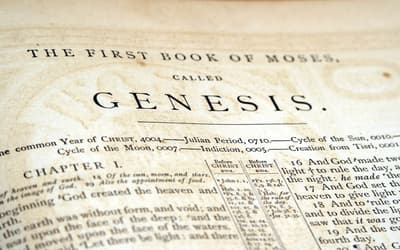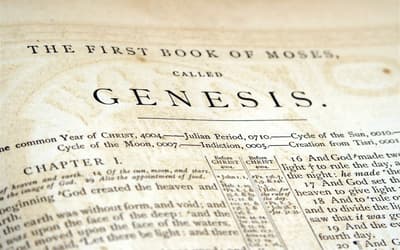The views expressed in this paper are those of the writer(s) and are not necessarily those of the ARJ Editor or Answers in Genesis.
Abstract
What God created in the beginning was “very good.” Old Testament scholar professor Jaco Gericke does not believe that: God creating things for the first time and calling them good without an axiological frame of reference is unintelligible. His philosophical reconstruction of the Most High and the axiology of Genesis 1 leads him to claim, among other things, that the “character” in the text was a realist, naturalist, and subjectivist; none of the things that God created had any objective value; nothing was assumed to be perfect; and what was good depended on whether or how much it was desired. The aim of this paper is to show that it is not unintelligible that God created everything good from the beginning; it is only unintelligible to the person who makes the claim.
Keywords: axiology, ethics, Genesis, good, goodness, value theory
Introduction
Axiology (Greek axio, “value”), is the theory of value or good. The aim of those who work in this area of ethics is to establish what things are good, what it is that makes them good, what kinds of value there are, how we can know that value claims are true, and to establish the relationship between value theory and the moral rightness of actions (Hirose and Olson 2015, 1; Schroeder 2016). For biblical Christians, it is natural to think about these issues in light of what is documented in the first book of the Bible. That is because Genesis 1 is foundational to their understanding of the origin of everything that exists, including value. Genesis 1 shows that in creating the universe, the Creator brought into existence good, very good, valuable things. Unfortunately, there are critics of Genesis 1 who find that unintelligible.
Professor Jaco Gericke,1 an Old Testament scholar at North-West University, South Africa, and co-chair of a new program unit of the Society of Biblical Literature dedicated to the Hebrew Bible and philosophy (Johnson 2016), is such a critic. His “personal obsession,” he says, is the Hebrew Bible, and he is confident that by subjecting the Old Testament to philosophical analysis, he can “enable biblical scholars of all persuasions to access levels of meaning that lie beyond the scope of linguistic, literary, historical, and socio-scientific perspectives on the text” (Gericke 2012, ix). In a recent paper entitled “A Philosophical Clarification of the Axiological Assumptions Behind the Concept of Goodness in Genesis 1,”2 he presents his reader with a “conceptual conundrum”: “the idea that a pre-cosmic judge all by himself creating things for the first time and calling them good without an axiological frame of reference makes no conceptual sense at all” (Gericke (2013, 213).3
After a brief elaboration of his conceptual puzzle, a survey of the various meanings of “goodness” in lexicons and dictionaries, and the reason why G. E. Moore (1993) concluded that goodness was indefinable, Gericke reconstructs the “value theory” in Genesis 1 (218−223).
The central point that I shall be trying to make in this paper is that it is not unintelligible that God created everything good from the beginning, for two reasons. First, the issue is too important to be ignored, and second, my hope is that my response will constitute a defense of the character of the Creator and the truth of Scripture. In the next section, I will briefly explain Gericke’s philosophical reconstruction, represent his core claims, and state what they imply for our understanding of the Most High and the axiology of Genesis 1. I will then respond to three crucial questions.
Gericke, the Most High, and the Axiology of Genesis 1
Gericke formulates three core axiological questions together with a number of conceptual distinctions, which he then applies to his analysis of Genesis 1.
The first question is a historical question: “What did the narrator assume”4 God “was doing when he ascribed value to some state of affairs?” Gericke claims that God “assumed that seeing ‘x is good’ involved attributing some property to an object,” and since God “assumed that evaluative statements purport to represent facts about the world,” God “was a value realist” (p. 218).
He then asks a metaphysical question: What was the nature of the property (i.e., “goodness”) that God “attributed” to the things He had created (p. 218)? He claims that “it is clear” that God “was not assumed to be a non-naturalist”; God identified “‘good’ with a natural property” and thought that “goodness” could be discovered or quantified “by empirical investigation” (p. 219).5 This means, for Gericke, that God was a naturalist.
Since Gericke is puzzled about how “a pre-cosmic judge” could all by Himself create things for the first time and call them good without an axiological frame of reference (p. 213), the epistemological question is straightforward: How did God know that “x was good?” Because Genesis 1 provides no objective standard against which God measured the goodness of the objects He had created, Gericke claims that nothing could have been objectively good “independently of how much they are desired or enjoyed.” Therefore, God was “assumed to be a subjectivist” (p. 219).6
Gericke’s reconstruction explained
For most naturalists, to say “x is good,” is deeply problematic. They think, and argue, that there is no such thing as absolute value (equivalently: plain good or good simpliciter or intrinsic goodness).7 In the words of Peter Geach (1956), “There is no such thing as being just good or bad, there is only being a good or bad so-and-so” (p. 34)—a good athlete or a good dentist; and in the words of Judith Thomson (1997), “there is no such property as goodness” (p. 275) or “being just good” (p. 279).8 These claims are based on certain highly contested assumptions.
The first is the idea that dissimilar objects, such as those referred to in Genesis 1:4, 10, 12, 18, 21, 25, and 31, cannot have the property of “goodness” in common. Objects are good only in some way, such as good at, good for, good as, good with, and good to use. Thus, and secondly, an attributive use of “good,” as in “x is good,” must be understood as elliptical talk or semantically incomplete sentences. Gericke puts it thus: God “did not understand good simpliciter in terms of attributive good. The divine judgments always presupposed elliptical good for sentences with some agent for whom it is good in mind” (p. 220; italics in the original). This means “good for” something relative to something else or from someone’s subjective point of view (Gericke 2013, pp. 219, 220), hence Gericke’s claim that the things in Genesis 1 can only be instrumentally, extrinsically, and conditionally good.9 “Good” is like the property “moving”; something can only move in relation to something else. However, Gericke claims that an object or state of affairs is intrinsically good “if it is good simply because of its internal nature” and if “It does not derive its value from anything else” (p. 220). Because that is indeed true, he owes his readers an explanation: What is the source of something’s nature and intrinsic value? Because something cannot come from nothing, logically speaking, intrinsic value must have a source.
The third assumption is that all objects can only be good in some respect when compared with some other objects of the same kind. In stating his “riddle” about how God could “see that something was ‘good’,” Gericke asks, “Good compared or as opposed to what alternative state of affairs?” (p. 212).
Gericke’s claims have at least the following consequences for our understanding of the Most High and “good” in Genesis 1:
1. Semantic implications
Sentences in which the phrase “it was good” appears must be understood as elliptical talk; God omitted or failed to qualify in what way “x was good.”
2. Metaphysical implications
To understand the metaphysical implications of Gericke’s claim that God is a naturalist, and therefore his denial that God made non-naturalist claims when He attributed “goodness” to His creation, it would be useful to note what ethical non-naturalist realists believe:10
- Ethical claims report or state facts about things in the world and such claims are true or false.
- Ethical claims represent facts that exist objectively, independently of what anyone may think, believe, feel, or desire.
- Evaluative ethical properties are not identical with natural properties.
With regard to (a), if Gericke’s claim that “what was good was assumed to be such and so” only because it was experienced like that from God’s perspective (p. 219), then we should wonder whether God deceived us when He said “it was good?” With regard to (b), Gericke denies that a “good thing [was] objectively so” (p. 219). Thus, what God said, when He said “x was good,” was His own subjective viewpoint. I hope to show that (c) does not follow, for it is based on incorrect premises.11 For now it suffices to say that the ontological goodness of objects make them suitable to some specific functional purposes and not others. But what I will argue for is not only that objects are good in different senses and for different purposes, but also that all good things have “goodness” in common.
3. Epistemological implications
Attributive goodness condemns as meaningless the application of “good” to objects in the absence of an objective standard or criteria of evaluation (p. 212). We can determine the “good’ of an object only when compared with others of the same kind. The same logic applies to human beings and God. For Gericke, the problem is that we cannot know apart from what God said whether what He said is true. There is, therefore, a danger in the neighbourhood; for if God is a subjectivist (p. 219), and we are unable to know whether what God said is true, then what He said may be true for Him but not necessarily true for us (i.e., relativism). I submit that we can know the truth about what God said, and even if God evaluated His works from His perspective, that does not make Him a subjectivist.
By way of summary, it should be evident that Gericke does not see his philosophical analysis of Genesis 1 as a good joke. To put it in the language of axiology, he thinks that his philosophical reconstruction of the Most High and “goodness” in Genesis 1 is both good and right. I will now attempt to show why, contrary to his thesis, God created everything good from the beginning.
Response to Gericke’s Reconstruction
I first want to stipulate a few assumptions and distinctions relevant to my axiological understanding of Genesis 1.12
1. Bearers of value: The bearers or carriers of value are objects, states of affairs (facts), properties, and relationships. Objects are wholes, their parts, and natures.
2. Goodness: It is the property of being good (equivalently: good absolutely, just plain good or intrinsically good). If something is absolutely good, then it is good at all times and places, and “goodness” is a property all good things have in common. Thus, if something is good, then it has a claim on moral agents: to love, desire, promote, respect, and care for it, but above all, not to destroy it. Therefore, to accept God’s claim that “x is good” means that its goodness does not depend on the perspective of any individual or group of people.13
3. Instrumental goodness: When something is instrumentally good, then it is good relative to something else. “Good for” is a benefiting relation: If x is good for an individual y, then x and y relate in such a way that x is suitable to or fits y, so that getting x sustains y’s existence, life, and well-being. Whether something is instrumentally good for an individual will depend on the nature and characteristics of the individual object. Some objects, such as rocks, are good for several other good things, and fulfil beneficial purposes. Others, such as fruit and vegetables, are instrumentally good for humans and only if they are also already intrinsically good.
4. Value: An object that has value is valuable. Beauty is not a value; something that is beautiful is valuable. Objects of value have certain characteristics (qualities) that are not only objective phenomena, but are also ontologically independent of the valuing subject. This implies that the goodness of an object that God created does not depend on whether or how much the object is liked, desired, approved of, preferred, or whether anyone has an interest in the object.
With that in mind, I shall next turn to Gericke’s questions.
The historical question
Gericke wants to know what God “was doing when he ascribed value to some state of affairs?” (p. 218). Based on the context of Genesis 1 and the sentences in Genesis 1:4, 10, 12, 18, 21, 25, and 31, I wish to suggest that there are at least six pieces of information which God conveyed to us about “goodness.”
1. The origin of value.
God reveals that not one of the things He created came into being accidentally. He introduced value into the world; value originated with Him, as everything else. Therefore, value, and what is of value, is not a human invention.
2. God represented and evaluated reality.
The fact that the word “saw” is repeated seven times in Genesis 1 suggests that God’s “seeing” should be at the center of our conception of the Creator; it is intended to represent reality, which cannot be accidental. For one of the names given to God in Genesis is El Roi, the “God who sees” (Genesis 16:13).14 If that means that nothing can escape God’s attention, that God was completely aware of, thus had complete knowledge of an actual state of affairs (facts), then we can assume that God used “good” not merely to describe the actual state of the objects; He also evaluated them. There is no reason to think that there is a logical gap between facts and descriptions on the one hand, and values and evaluations on the other hand. If I, for instance, say that someone is good, I am partly describing him. I am saying that there are certain facts about him―facts which I regard as sufficient to justify the use of the word “good.” We may, therefore, see the word “good” as God’s general standard for the evaluation of things. Also, if the meaning of a word depends on its use in a particular context (cf. Barr 1961, 217−218; Carson 1996, 31n. 13), then Genesis 1:1–31 provides all the evidence we need to determine the meaning of “good.” Thus, the fact that God did not specify the way “x was good” must mean that God intended it that way. Simply stated, everything was good in every respect.
3. God knows what is good for mankind.
God reveals that He prepared the earth for man to inhabit (Genesis 1:1–26; cf. Isaiah 45:18). We can, therefore, infer that God, as the Provider for all, knew perfectly well what was beneficial or good for mankind. For example, if we know that what we call “vitamin C” is good for us, then God expects that oranges be squeezed and their juice be drunk
4. All objects shared the same property.
God reveals that He applied the predicate “good” to similar and dissimilar objects. It is, therefore, natural to think that everything shared the same property of “being good” or “goodness.” That, however, needs to be qualified to avoid misunderstanding.
It would be a mistake to think that God applied the concept of “good” to all objects in entirely the same way. If He had, then we would wonder if grass, plants, trees, creeping things, animals, humans, and God can be good in exactly the same way. The alternative is to see that everything had the same property in common but in different degrees.15 Speaking analogously, if “goodness” is like a genus, then good objects can relate to it as species. Consider, for example, shape. No object can have a shape without a particular shape, but what unites circles, squares, and triangles is common to them all, namely, shape. The same is true of color, fruit, and personhood. Thus, the fact that each of the objects that God created can be said to be a good so-and-so or in some way, does not mean that dissimilar kinds of objects cannot share “goodness” as a property. There is another way to make the same point.
The fact that God created human beings to rule over the earth (Genesis 1:26, 28), and that governance presupposes intelligence, means that God must not only be intelligent Himself, but more intelligent―He cannot be less intelligent. The same truth applies to “goodness.” What is different between God and the things He created is the mode of their goodness. God has qualities without any limits, and those of humans and other creatures are suitable to their mode of existence, nature, purposes, and life. Taken together, these truths not only explain why humans can distinguish between several types and grades of goodness, but also why humans have a reason to care for, promote, love and desire, and above all, not to destroy what is good. The least we can say is that Genesis 1 explains why God created humans as opposed to any other creature to take care of His good Creation. The next point dispels any notion of an imperfect universe.
5. The absence of evil.
Genesis 1:1−31 leads to the logical conclusion that perfect goodness entails the absence of evil. There is no mention of any sickness, suffering, or death in that chapter. It suggests that the overall state of Creation was totally peaceful and harmonious. Therefore, God was not the cause of evil in our world.
6. Different categories and ways of goodness.
Genesis 1 allows us to identify at least three main categories of goodness, and at least three senses in which the goodness of each object can be further qualified.
- Objects were functionally good. The objects that God created were functionally good, as wholes, in their parts, and their natures (capacities, abilities, and tendencies). Each whole and its parts functioned as God designed and intended them to function. There is no indication of heart attacks, kidney failures, blind eyes, deaf ears, or broken legs in Genesis 1. We can say that everything fulfilled the purpose for which it was created as well as that it was suitable for the purpose for which God had created it (cf. Psalm 94:9; Proverbs 20:12).
- Objects were esthetically good. The objects and the overall state of Creation in Genesis 1 were unique and beautiful to experience―to look at their colors, shapes, and harmonious arrangements―and some to taste, touch, smell, and listen to.16 Genesis 2:8−9 states that the trees in the garden that God had planted there were “pleasant to the sight,” which suggests the total absence of ugliness. To the uncorrupted eye and ear it must have been awesome.
- Certain objects were morally good. Since there is no sign of any killing, rebellion, or sin against God in Genesis 1, we can discern a third category of goodness: moral goodness. Scripture says, “God had made man upright” (Ecclesiastes 7:29), the only explanation of which is the nature of his Creator: “Good and upright is the Lord” (Psalm 25:8). It affirms what is impossible: a good and upright God could not have failed to create good and upright human beings.
Objects in these categories of goodness can be further qualified.
(i) As plain good or intrinsically good.
Objects or states of affairs that are plain good are good for their own sake or in themselves. Some of these are living and non-living creatures, companionship, beauty, knowledge, enjoyment or pleasure, peace, and harmony. Therefore, what is plain good may always be good for something or good as a particular kind of thing. That means that such objects and states of affairs are intrinsically good. It has at least the following three logical implications.
The first is, it is in virtue of x’s intrinsic qualities that x is good or good in itself. Therefore, and second, when God said “x was good,” He did not mean that it was intrinsically bad. The third is, what is intrinsically good does not depend on anyone’s point of view, or on whether it was desired, or on how much it was desired by anyone, except by God. That is so because God is not only the ultimate source of goodness, but also because goodness is rooted in the most stable and unchanging standard in existence―God’s character (cf. Numbers 23:19; Malachi 3:6; James 1:17).17 All three points are affirmed by the Apostle Paul: “I know and am convinced by the Lord Jesus that there is nothing unclean of itself” (Romans 14:14), and “every creature of God is good” (1 Timothy 4:4).
(ii) Being good for.
This sense of “good” means that “x is good” relative to something or someone else (is not to be confused with a subjective point of view). It means that whatever is good for something is instrumentally good, when it serves as a good means to good ends (well-being). For example, grass would have been good for horses, and seeds and fruit good for humans as food (cf. Genesis 1:29−30, 2:8−9, 3:6). God also created the sun, moon, and stars to “be for signs and seasons, and for days and years” (Genesis 1:14−15), and in Genesis 2 we read it “was not good that man should be alone” (Genesis 2:18; also v. 20). This sense of goodness has the following logical implication. Some things are good for certain objects but not others (for example, grass); while some things, for example, sunshine and water, will be good for most or all other things. Note, however, grass would not lose its intrinsic or plain goodness if it had not been good for humans; it simply means that it would not have been suitable to them as food.
We can infer other senses of “good” as well. The wool of sheep would have been “good as” material to sleep on; some objects would have been “good at” certain things, for instance, running at a certain speed (a horse), and others good at seeing in the dark (a wolf or an owl). There is also reason to think that some things would have been good “to have” and “to do.” For some objects it would have been good to have a lot of sunshine and humans to have friendship with one another and with their Creator (cf. Genesis 5:24; Isaiah 41:8; James 2:23), and to take a swim, to enjoy bird watching, and to work.
(iii) Good kinds of things.
A particular kind of object or state of affairs could, therefore, have been good in several respects as a member of its kind. That is so because the properties (capacities, abilities, or powers) that it has are essentially related to it, thus rooted in its nature. And as we noted earlier, there is no reason to deny that a particular tree could not have been a good tree, or a particular horse not a good animal, or the first human not a good person.
I conclude that it is not correct to claim that the words “it was good” was merely attributive on the basis of non-specificity. It is also a mistake to think that goodness cannot be predicated of similar and dissimilar things.
The metaphysical question
Gericke’s second question, as noted earlier, is about the nature of the “goodness” that God attributed to the things He had created (p. 218). Since “what is good simpliciter [i.e., intrinsically good] did not differ from what is good from the perspective” of God (p. 219),18 what God said, when He said “x was good,” must be true from God’s subjective viewpoint only. But why should we think that makes God a subjectivist? Although I will return to the point again, for now I want to make two remarks. Firstly, if the “kind of goodness” that God “was concerned with depended on what is desired” (p. 219), then we are in the dark as to how someone’s desire can make something good. How much desire would be required to make a bad apple a good one? I submit that that kind of logic places the cart before the horses. Secondly, if an object is intrinsically good when “it is good simply because of its internal nature” and if “It does not derive its value from anything else” (p. 220), then intrinsic value cannot come from nowhere. What we have seen is that the source of all value is the Most High. But Gericke goes a step further. He claims that God “knew nothing of such [intrinsic] goods without anyone to enjoy them” (p. 220). But if Gericke claims to know what the Creator knows and does not know, then he needs to explain why we should accept his claim when we know that the Bible does not describe God as just any creator; He is the Almighty God: “In the beginning God created the heavens and the earth” (Genesis 1:1) in six literal, 24-hour days.
I will argue that God did not need an objective standard independently of Himself in order to justify His evaluation of everything He had created as “very good.”
The epistemological question
So how can we know that what God said, when He said “x was good,” is true?
If God is the best of a genus or a paradigm of power, intelligence, and goodness, then He requires no standard outside Himself against which to measure the power, intelligence, or goodness of lower beings. Why could God’s own character or nature not be the standard of goodness?19 If God had to use an independent standard of goodness, then He and His creative acts had to be subject to that higher standard, and God would not be the Most High (Genesis 14:18; Luke 1:32). If, on the other hand, there had been such a standard, then someone can always ask whose standard that was; which creates a problem of infinite regress of explanation. Therefore, if God’s nature is the frame of reference for “goodness,” then there are at least three reasons to think that what God said, when He said “x was good,” can be neither arbitrary nor subjective at all.
The first reason has already been alluded to: the Most High must be a perfect Being, and a perfectly good Being cannot fail to create good things. It is exactly how the Most High represents His character or nature and His good Creation in Genesis 1. At least, it explains the absence of evil and the logical meaning of the word “all” in Genesis 1:31: whatever is true of all things is true of each particular thing. In other words, the word “all” logically excludes the possibility that only some of the things were good.
The second reason has also been alluded to: what makes it impossible to believe that what God said could be arbitrary is that it could not be possibly false. The rest of Scripture bears witness to the truth of His utterances, including our Lord Jesus Christ and His apostles (cf. Genesis 1:1−31 with Psalm 102:25; Isaiah 40:21−22; 2 Corinthians 4:6; Hebrews 11:3; Romans 14:14; 1 Timothy 4:4; and James 1:17). It is unthinkable that God would misrepresent the goodness of His Creation and then allow millions and millions of people to believe what He said while He knows that it is not so. The fact that Gericke fails to bring the rest of Scripture to bear on his analysis of Genesis 1 underlines what is lacking in his philosophical method. But since God is a “God of truth” (Isaiah 65:16) “who cannot lie” (Titus 1:2), and for whom it is impossible to lie (Hebrews 6:18), we accept that He is utterly invulnerable to evil. It is impossible for Him to do, or to be, evil (cf. James 1:17). We, therefore, also accept with absolute certainty that what God said is true.
Finally, the previous points make it clear that we do not have to accept that God was a subjectivist. Because God cannot lie and is not vulnerable to evil, what God said cannot be but be in line with reality. In addition, common sense teaches that no amount of desire can turn poison into something good if it is dangerous to human health. Thus, the objects that God created could not have been good just because they were desired; they were desired because they were plain or intrinsically good in themselves. If that were not so, then it would be difficult to understand passages such as Genesis 2:9, 12, 18, 3:6; Romans 14:14; and 1 Timothy 4:4. The same point applies to the goodness of the Creator. When the Psalmist wrote that there is no one on earth that he desires besides God (Psalm 73:25), he desired God because God is good.20
I will summarize my response with a few final remarks.
It is incoherent to say that something can only be good in a qualified way or only good for something or someone. Apples are generally good―in the context of Genesis 1 they could not have been but good―from no particular point of view, accept God’s. They are just plain good. Therefore, if some x is good for someone or something, then logically speaking, it must be already good (i.e., intrinsically good). It means that if the nature of an apple is not good, or had not been good in Genesis 1, then it could not have been good for anything or anyone at all.
If x’s goodness derives from y’s, then x’s goodness depends for its goodness on its relation to something else that is good. But this is not a problem in Genesis 1; the whole Creation depended on God for its existence, including goodness, so it does not mean that what depends on God is not just plain good or intrinsically good. Grass did not derive its goodness from horses, but from God; again, it could not have been good for horses if it was not already good in itself.
God created the first humans male and female (Genesis 1:27). That is because companionship, either in the form of friendship or a marital relationship, is just plain good and good for human beings. Also, companionship and its value are extrinsically related to happiness, for both depends on two persons, and is, therefore, conditional. But these facts do not imply that companionship and happiness, even if they depend on certain conditions, have no intrinsic value. It is also true that unconditionally good things do not depend on anything else for their value, except God. But what makes them unconditionally good must be looked for among their intrinsic properties (i.e., their nature), for example, gold (Genesis 2:12) and human beings (Genesis 9:6; James 3:9). So, why should we think that things of unconditional value could or should not depend on enabling conditions? Neither does it follow that if x depends on y for its goodness, that x’s value is extrinsic. Although the value of someone’s life depends on an act of procreation (the enabling condition), it remains a fact that one’s life has intrinsic value. It is, therefore, a mistake to think that dependence on external conditions makes a value necessarily extrinsic.
Conclusion
Knowledge of the goodness of the Most High and His Creation echoes throughout the pages of the Bible. The source of that knowledge is Genesis 1:1−31. Or, to put it slightly differently, the source of our knowledge of “good” is our Creator. Axiology is, therefore, not a human invention. In Genesis 1 God shows us what the bearers of value are (what things are good), what it is that makes them good, what kinds of value there are, and how we can know that the Most High’s value evaluations are true. In the final analysis, an all-powerful, most intelligent, and perfectly good God cannot fail to create good things for the first time. If that is unintelligible, then it is only unintelligible to the person who makes the claim.
Acknowledgements
I wish to thank Philip du Toit, Johannes Malherbe, Matt Dawson (especially) and two anonymous reviewers of this paper for their valuable suggestions and corrections.
References
Alm, David. 2013. “Subjectivism, Ethical.” In The International Encyclopedia of Ethics, edited by Hugh LaFollette, 5050−5055. Malden, Massachusetts: Blackwell Publishing Ltd.
Anderson, Lee, Jr. 2013. “Thoughts on the Goodness of Creation: In What Sense was Creation ‘Perfect’?” Answers Research Journal 6: 391−397. https://answersingenesis.org/physics/thoughts-on-the-goodness-of-creation-in-what-sense-was-creation-perfect/.
Barr, James. 1961. The Semantics of Biblical Language. Oxford, United Kingdom: Oxford University Press.
Bradley, Ben. 2013. “Intrinsic Value.” In The International Encyclopedia of Ethics, edited by Hugh LaFollette, 2770−2779. Malden, Massachusetts: Blackwell Publishing Ltd.
Carson, Donald A. 1996. Exegetical Fallacies. 2nd ed. Grand Rapids, Michigan: Baker Books.
Cassuto, Umberto. 1941. The Documentary Hypothesis and the Composition of the Pentateuch, translated by Israel Abrahams. Jerusalem, Israel: Magnes Press.
Cassuto, Umberto. 1961. A Commentary on the Book of Genesis, Part 1: From Adam to Noah, translated by Israel Abrahams. Jerusalem, Israel: Magnes Press.
Dancy, Jonathan. 2006. “Nonnaturalism.” In The Oxford Handbook of Ethical Theory, edited by David Copp, 122−145. Oxford, England: Oxford University Press.
FitzPatrick, William J. 2008. “Robust Ethical Realism, Non-Naturalism, and Normativity.” In Oxford Studies in Metaethics, Vol. 3, edited by Russ Shafer-Landau, 159−205. Oxford, England: Oxford University Press.
Geach, P. T. 1956. “Good and Evil.” Analysis 17, no. 2 (December): 33−42.
Gericke, Jaco. 2012. The Hebrew Bible and the Philosophy of Religion. Atlanta, Georgia: Society of Biblical Literature Press.
Gericke, Jaco. 2013. “A Philosophical Clarification of the Axiological Assumptions Behind the Concept of Goodness in Genesis 1.” Journal for Semitics 22, no. 1 (January): 210−225.
Helm, Paul. 1990. “Goodness.” In A Companion to the Philosophy of Religion, edited by Philip L. Quinn, and Charles Taliaferro, 243−249. Oxford, England: Blackwell Publishing Ltd.
Hirose, Iwao. and Jonas Olson. 2015. “Introduction to Value Theory.” In The Oxford Handbook of Value Theory, edited by Iwao Hirose, and Jonas Olson, 1−9. Oxford, England: Oxford University Press.
Johnson, Dru. 2016. “Jaco Gericke. The Hebrew Bible and Philosophy of Religion. Society of Biblical Literature Resources for Biblical Study; no. 70. Atlanta: Society of Biblical Literature Press, 2013. Seizo Sekine (trans. J. Randall Short). Philosophical Interpretations of the Old Testament. Translated by J. Randall Short. Beihefte zur Zeitschrift für die Alttestamentlich Wissenschaft, vol. 458. Berlin, Germany: De Gruyter, 2014.” Journal of Analytic Theology 4 (May): 428−433.
Kraut, Richard. 2011. Against Absolute Goodness. Oxford, England: Oxford University Press.
Moberly, R. W. L. 2009. The Theology of the Book of Genesis. Cambridge, England: Oxford University Press.
Moore, G. E. 1993. Principia Ethica. Rev. Ed. Cambridge, England: Cambridge University Press.
Morris, Thomas V. 1991. Our Idea of God: An Introduction to Philosophical Theology. Downers Grove, Illinois: InterVarsity Press.
Orsi, Francesco. 2015. Value Theory. London, United Kingdom: Bloomsbury.
Schroeder, M. 2016. “Value Theory.” Stanford Encyclopedia of Philosophy. http://plato.stanford.edu/entries/value-theory/.
Sturgeon, Nicholas L. 2006. “Ethical Naturalism.” In The Oxford Handbook of Ethical Theory, edited by David Copp, 91−121. Oxford, United Kingdom: Oxford University Press.
Thomson, Judith Jarvis. 1997. “The Right and the Good.” Journal of Philosophy 94, no. 6: 273−298.
Tropman, Elizabeth. 2008. “Naturalism and the New Moral Intuitionism.” Journal of Philosophical Research 33: 163−184.
Zimmerman, Michael J. 1999. “In Defense of the Concept of Intrinsic Value”. Canadian Journal of Philosophy 29, no. 3 (September): 389−409.








